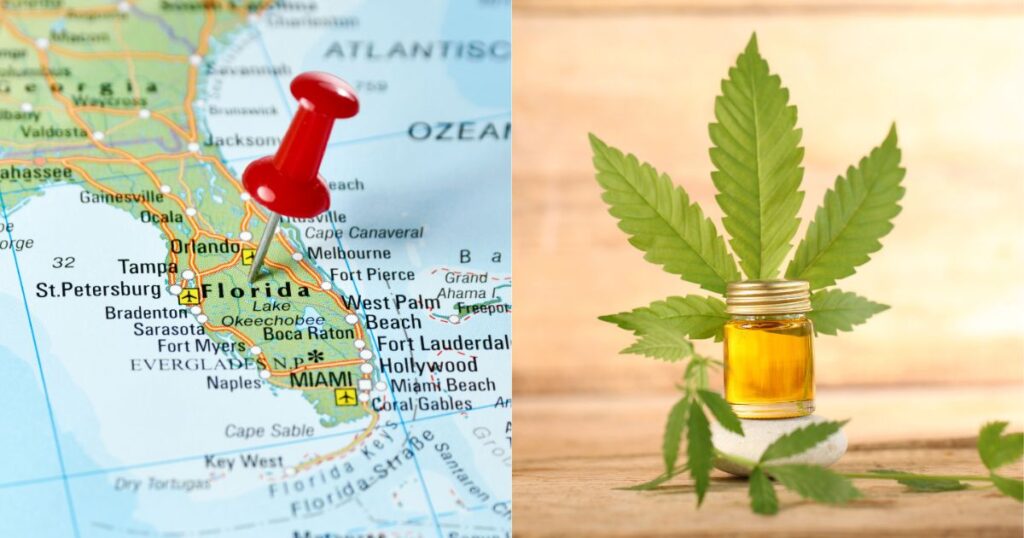Earlier this week, the Florida Senate unanimously passed (37-0) Senate Bill 438 (SB 438), a piece of legislation introducing stringent regulations for the state’s hemp industry. Which not long ago a similar bill was vetoed by Governor Ron DeSantis in 2024, signaling ongoing concerns about hemp-derived products in Florida. While supporters of SB 438 believe the revisions address the governor’s previous objections, the implications of this bill for the state’s hemp industry could be significant if it becomes law.
What SB 438 Proposes
SB 438 outlines a regulatory framework for hemp products in Florida, with a particular focus on limiting intoxicating hemp-derived products such as Delta-8 and Delta-10 THC, which have gained popularity in recent years.
The new regulations propose a ban on products containing Delta-8 and Delta-10 THC cannabinoids, prohibiting their sale entirely. Additionally, the bill sets strict limits on THC content in hemp products, restricting it to less than five milligrams per serving and no more than 50 milligrams per product container. THC-infused beverages would also face new restrictions, with a cap of five milligrams per container, and could only be sold in locations licensed to distribute alcohol.
To ensure compliance with state THC limits and safety standards, all hemp products would be required to undergo testing in certified marijuana labs under SB 438. The legislation also introduces retail limitations, prohibiting retail locations that sell hemp products from operating within 500 feet of schools, daycare centers, or gas stations. Furthermore, retailers must secure hemp products behind the counter or lock them away to limit accessibility.
Consumer protections are also a major focus of the legislation. Authorities will enforce stricter labeling and marketing requirements to crack down on packaging that appeals to children or resembles popular branded food products. Lawmakers say they have crafted these measures with the aim of establishing a safer, more regulated market for hemp products.
Senators Colleen Burton (R) and Tracie Davis (D), who co-sponsored the bill, expressed their determination to implement these measures, citing concerns about public safety and the need for greater regulatory oversight in what they characterized as a “wild west” industry.
Last Year’s Veto and Implications for the Florida Hemp Industry
One of the primary differences between the 2025 version of the bill and last year’s is a response to the specific concerns outlined by Governor DeSantis when he vetoed the 2024 legislation. Among them were calls for stricter control over where hemp businesses could operate and stronger safeguards to prevent products from reaching children. The bipartisan sponsors of SB 438 say that these changes now meet the governor’s requirements.
Senator Davis remarked, “This is the bill that actually answers all of the governor’s questions when he vetoed it.” By addressing those issues, the lawmakers hope to avoid a repeat veto and gain broader support for the legislation.
The push for tighter hemp regulations in Florida comes when growing concerns about the availability and safety of products containing hemp-derived THC.. Advocates of SB 438 argue that stronger regulations will help protect consumers while weeding out unsafe products from the market.
However, for Florida’s hemp industry, the regulatory overhaul, if passed, would bring a significant challenge. Hemp entrepreneurs have warned that measures like those in SB 438 could lead to substantial losses for businesses, job cuts, and an overall decline in the industry. Over the years, Florida has become a hub for hemp cultivation, with thousands of small and medium-sized businesses relying on the trade.
A shift in the regulatory framework could also impact the availability of certain products that many consumers rely on, particularly those seeking alternatives to traditional cannabis-based medicines.
The Road Ahead
While SB 438 has cleared the Florida Senate with unanimous approval, the process isn’t over yet. Its companion bill in the House, HB 1597, must clear two more committee stops before it reaches the chamber floor for a full vote. Should it pass, it will then return to Governor DeSantis’s desk for his consideration.
If signed into law, the bill will go into effect on October 1, 2025, ushering in an era of intensified regulation not only for Florida’s hemp businesses but also for consumers who have come to rely on these products.
With the legislative process ongoing, stakeholders and community members alike are closely monitoring the progress of SB 438 and its companion bill. It remains unclear if DeSantis will approve this updated version of the legislation.

















